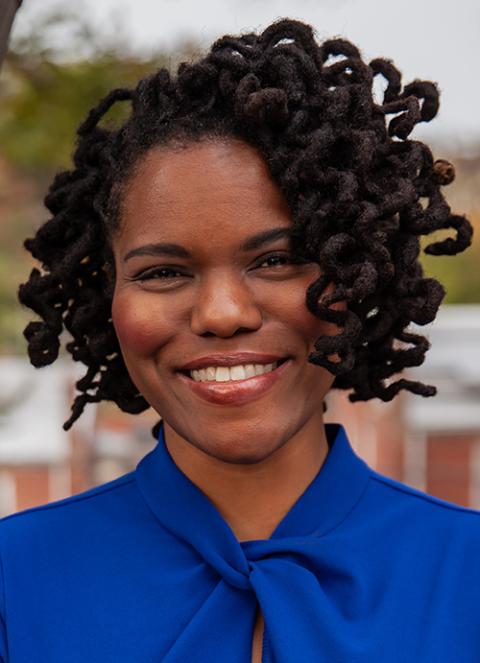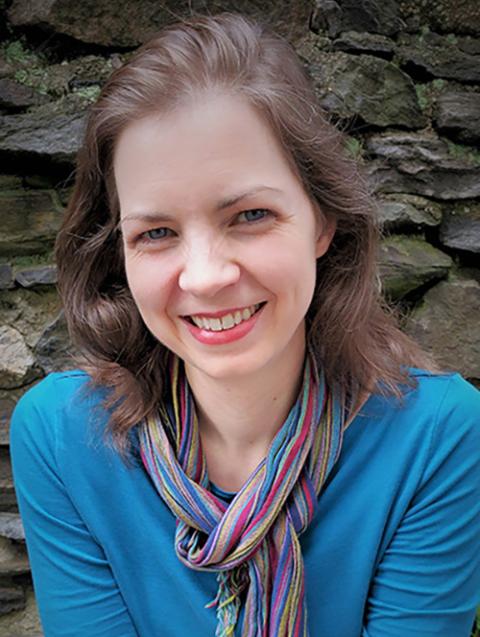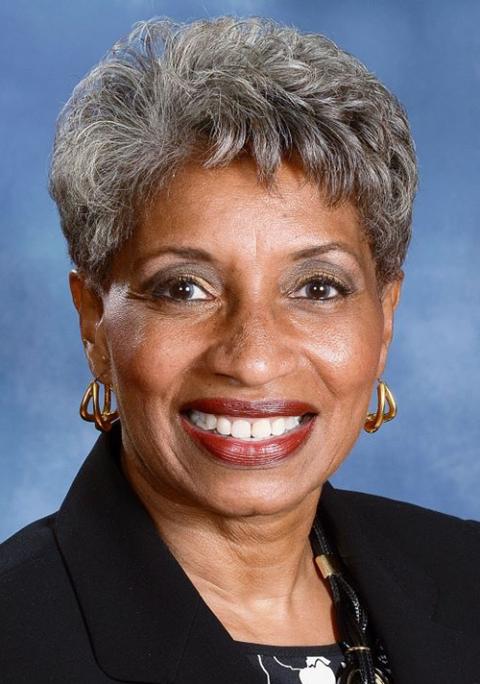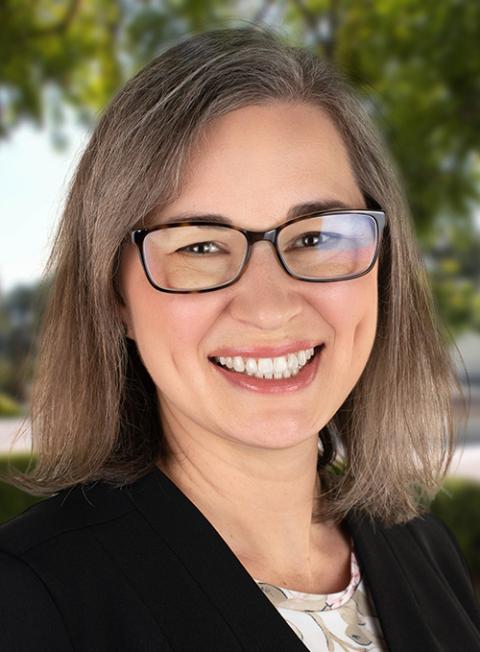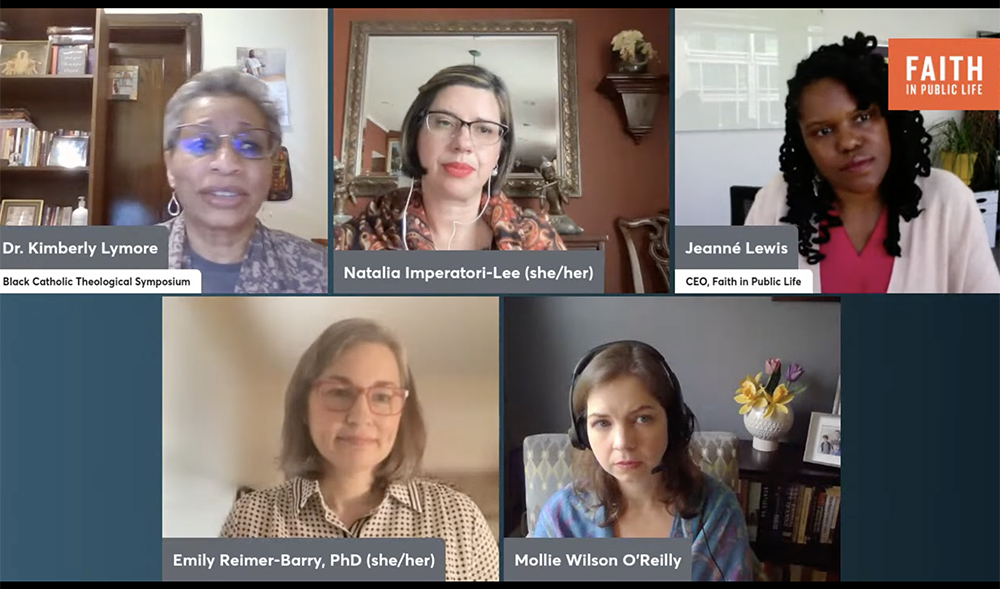
Panelists participate in an April 18 discussion convened by Faith in Public Life titled "Catholic Women: Reclaiming Debates about Abortion and Reproductive Justice." The online event was held in conjunction with an open letter signed by more than 30 Catholic women scholars, theologians and advocates. (NCR screenshot/YouTube/Faith in Public Life)
The stringent anti-abortion activism of many U.S. Catholic leaders, including the bishops' conference, has ignored the complex lived experience of women, the realities of racial and economic inequities, and the importance of personal discernment in moral decision-making.
This assessment — coupled with a call for "brave spaces" where women can share their stories about pregnancy and parenthood — was articulated by Catholic mothers, scholars and advocates during an unusually frank panel discussion April 18. The online event, titled "Catholic Women: Reclaiming Debates about Abortion and Reproductive Justice," was organized by Faith in Public Life, a progressive interfaith nonprofit based in Washington, D.C. The event came a week after the organization published a letter highlighting similar points.
Mollie Wilson O'Reilly, a mother of four and editor at large for Commonweal magazine, said during the discussion that a miscarriage and subsequent emergency medical procedure helped her realize that as a Catholic "I'd been told a story that wasn't true, that wasn't taking into account the actual real-life experiences of people like myself, and that the story was undervaluing the lives of women."
O'Reilly was also among the more than 30 Catholic women scholars, theologians and advocates who signed the recent open letter. It urges elected officials to support robust social policies for families, calls for more thoughtful conversations about abortion, and says it's critical for the church to hear women's voices on reproductive issues in an organization that is led by an all-male clergy.
Nearly 200 individuals have since added their name to the statement.
"We are moved by compassion and conscience to say clearly that laws and policies celebrated as 'pro-life' by our Church leaders often hurt women and demean our dignity," it reads.
Jeanné Lewis, interim CEO of Faith in Public Life and moderator of the April 18 panel, said Catholics' conversations about abortion are often held "privately or in whispers or avoided altogether," while the rhetoric from church leaders is "too simplistic." The letter and the panel were ways to amplify a nuanced discussion within the public sphere, she said.
Catholics must "wrestle with interconnectedness and the complexity in which we live," said Lewis.
O'Reilly recalled how she'd woken up in the hospital after her miscarriage thinking about how things might have been different if she'd been treated in a Catholic facility, where "barriers exist for women receiving the kind of care I had received."
She'd undergone dilation and curettage, a procedure that scrapes tissue from the uterus after a miscarriage or an abortion. It was needed to "stop the bleeding and save my life," said O'Reilly.
The miscarriage experience, occurring before the Supreme Court's 2022 decision in the Dobbs case, which overturned Roe v. Wade and scuttled the constitutional right to abortion care, led her to conclude that abortion is health care — "health of the mother is a real thing and not just a loophole" — and that the church's pro-life position "had no room for experiences like mine."
"Even though through that whole ordeal I was leaning on my faith to sustain me, I couldn't lean on my church, because it just wasn't there," O'Reilly said. "It had nothing to say to me in my vulnerability."
According to a January 2023 report from the Gender Equity Policy Institute cited in the open letter, women in states with abortion bans are now nearly three times more likely to die during pregnancy or childbirth or soon after giving birth.
Panelist and letter signee Natalia Imperatori-Lee, chair of religious studies at Manhattan College in the Bronx, New York, and a mother of two, said the notions of childbearing and child-rearing often are abstract until someone goes through them themselves or walks closely with those who do.
Like O'Reilly, she shared a story of miscarrying and how devastating it was. The silence around pregnancy causes many women to believe it is always straightforward and leads "to a healthy bouncing baby most of the time," said Imperatori-Lee. "That was not the case for my body or many of my friends."
'If God can entrust women to relay the things they have lived and seen and believed, what is keeping the church from doing the same?'
—Natalia Imperatori-Lee
She said her views on reproductive justice were informed by miscarriage and by the many students on her college campus who are survivors of sexual assault.
"The complexity with which they want to approach and take ownership of their experiences and how they do or do not want to involve different authorities for fear of being retraumatized, it opened up for me that women's bodies are not just their own in a society that doesn't take sexual assault seriously," said Imperatori-Lee. "It turns out women are still not treated as reliable narrators of their own experience."
She's concluded that "the law is too blunt an instrument to deal with the complexities" of pregnancy and childbirth and encourages Catholics to see women as "moral agents" who can make informed choices and to move away from legalistic, static notions of life to what Pope Francis calls "an experience of encounter."
As a Black woman and theologian, Kimberly Lymore, director of the Augustus Tolton Pastoral Ministry Program at Chicago's Catholic Theological Union, said she's always viewed reproduction issues not in isolation but in the context of myriad social challenges.
"When we talk about pro-life in the Black community, we truly talk about the womb to the tomb, and it's one thing to get the baby born, but how do you care for the child?" said Lymore, who is convener of the Black Catholic Theological Symposium.
"Do you give them a good education, do they have the right to health care and to grow up healthy and be productive in life? We don't want to just have them born and then have families who can't take care of them due to the systemic racism that exists in this country."
Lymore pointed to the high maternal and infant mortality rates in the Black community, realities highlighted in the letter.
In 2021, the United States had one of the worst rates of maternal mortality in the country's history, but for Black women the rate is nearly three times higher than for white women.
Among the letter's other signatories are Marie Dennis, past co-president of Pax Christi International and current senior program director for the Catholic Nonviolence Initiative; and Neomi De Anda, an associate professor at the University of Dayton, Ohio, and past president of the Academy of Catholic Hispanic Theologians of the United States.
The letter, coming after an earlier statement published by Faith in Public Life from Catholic religious sisters who oppose the criminalization of abortion, praises church leaders who "walk with people as pastors." But it says a vocal segment of clergy, including bishops, have created "a culture of stigma and shame that shuts down conversations about women's health."
Emily Reimer-Barry, associate professor of Christian ethics at the University of San Diego, signed the letter and was part of the panel. Her family's experience with the high cost of child care led her to realize that conversations about contraception and abortion need to take into account child-rearing expenses and other everyday aspects of women's lives, "whether we are talking about just wages, environmental justice, or what it means to raise families in safe and healthy communities."
Reimer-Barry argued there's an intersection of Catholic social teaching with issues of sexual justice, noting she was "deeply grateful" to the Black women who "pioneered this really important work of looking at structural injustice."
"In reading the work of Black women who are activists in the reproductive justice movement, I've learned so much about the principles of Catholic social teaching that I hold so dear — human dignity, common good, labor justice — that these also intersect with the work that Black women have been doing to advocate for the flourishing of all people with uteruses."
In response to the letter and announcement of the panel discussion on social media, there was a rapid onslaught of criticism. Some on Twitter called the signatories "heretics" and "apostates."
O'Reilly said it was an unsurprising response that extends beyond social media. She said the letter contains nothing that contradicts church teaching or the belief that human life is sacred, and that such responses are "a learned script."
Advertisement
The panelists and the letter's authors called for Catholic institutions, as well as lawmakers and church leaders, to do more to support women and families.
Echoing the other panelists, Reimer-Barry said Catholics need to accompany women in their discernment and "create brave spaces for pregnant women to share their stories."
Catholics just celebrated Easter, added Imperatori-Lee, and read accounts from the Gospel about how women stayed with Jesus at the crucifixion, were the first to see the risen Jesus, and were sent to tell the disciples the good news of the paschal mystery.
"If God can entrust women to relay the things they have lived and seen and believed, what is keeping the church from doing the same?" she asked. "What is keeping us from trusting women when they are telling us over and over again that these decisions are complex and we need room for conscience and discernment?"

